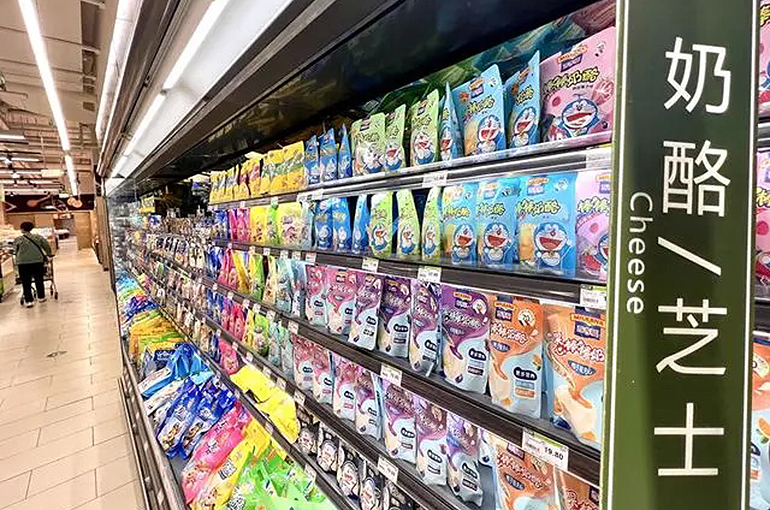 China’s Slowing Cheese Sales Are Unlikely to Pick Up Soon due to Cultural Differences, Industry Insiders Say
China’s Slowing Cheese Sales Are Unlikely to Pick Up Soon due to Cultural Differences, Industry Insiders Say(Yicai) Oct. 25 -- Cheese consumption in China was sluggish last year, after four years of strong growth, and it will be difficult for the cheese industry to return to fast growth in the short term due to the differences in Chinese and Western food cultures, industry insiders said.
China’s cheese market expanded 6.5 percent in 2022 from the year before, according to the latest data. This is a big slowdown from the annual compound growth of 30 percent since 2018. Much of the early growth was driven by cheese sticks, which is a snack for children, and it has yet to become part of the regular diet.
Even though many cheese producers launched a variety of new products to appeal to adults at the start of the year, the outlook for this year is not good.
Even cheese snacks are not selling as well as they used to, especially in the north of the country, a cheese business owner told Yicai. The freezers in a supermarket in Beijing, which used to be filled with all kinds of cheese snacks, now are stocked with other foods, Yicai noticed.
“Sales and prices of cheese sticks have tumbled this year," Yue Taiguang, executive deputy general manager of Shanghai Mubao Food Technology, said at the Dairy Capital Forum held last week.
Cheese producers are frustrated with the industry outlook. Some have abandoned the northern market and some have given up completely, Yue added.
It is difficult to maintain sustained growth when the main product in the market are cheese stick snacks, said Guo Benheng, founder of cheese product maker Cheespirit and former president of dairy giant Bright Dairy. These snacks are not in constant demand among Chinese households.
Cheese is not a staple food as it is in the West and many Chinese people are not accustomed to its taste, said Guo. Cheese makers need to try to shift demand away from snacks to a regularly consumed food to boost consumption.
The slump in cheese sales has more to do with cyclical factors, Hu Zongtian, head of public affairs and investor relations at cheese stick maker Milkground Food Tech, told Yicai. Therefore, it is still necessary to focus on cheese snacks which suit Chinese tastes. Cheese producers should promote the use of cheese in China’s catering culture to increase daily consumption.
Cheese is not in constant demand by Chinese people, said Song Liang, an independent dairy analyst. Therefore, the cheese sector needs to promote more cheese consumption scenarios, integrate them with Chinese dining habits, and focus on the younger generation.
Editors: Tang Shihua, Kim Taylor